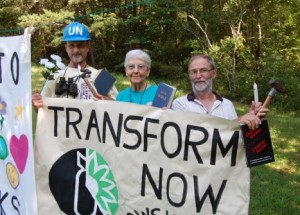by Ralph Hutchison, OREPA
Greg Boertje-Obed was released from Blount County Detention Center at 8:30pm on Tuesday, September 11, 2012 to await trial, currently scheduled for February 26, 2013.
Greg’s release came as a result of his request for a detention hearing following the reset of the trial date from October to February. He had originally declined to seek release, but told the judge he was now prompted by the difficulty of trying to consult with co-defendants in preparing for trial and by family concerns.
At the detention hearing, Assistant District Attorney Melissa Kirby rehearsed her well-worn reasons why Greg should be locked up, adding that he had warned the court earlier he would not accept or comply with conditions of release. Then the judge asked her if Greg, with his lengthy record, had in any instance not shown up for court. She admitted she had no evidence of that. “He was convicted numerous times in the past, so I assume he was in court,” she said. “However, in this case he said he would not appear.” “I don’t believe he said that,” the judge said.
Greg told the judge he had a 100% record of appearance in prior cases for “anything I have been arrested for, all of which, in my opinion, were ‘good deeds.’”
The judge subjected Greg to a lengthy interrogation—an apparent payback for Greg’s earlier refusal to accept release unless the judge declared nuclear weapons to be a war crime. In the end, after Greg attempted to explain his living situation at the Catholic Worker in Duluth (“Is it a part of the Catholic Church?” “No.” Is it affiliated with any church?” “No, but many churches contribute to our work.” “How did it get the name, then?” “In 1933, the name Catholic Worker was chosen by the founders.” “Huh.”) The judge then asked Greg what he did in Duluth and Greg said he found work painting houses, landscaping, and volunteering hospitality to homeless and others in need.
Finally indicating that he might accede to Greg’s request, the judge asked about what he would do if he were released. “Do you have a place to stay locally until you can get a bus to Duluth?” Erik Johnson rose from the audience. “My wife Libby and I would be honored to provide hospitality to Greg.”
The judge took a recess. When he returned, he walked the court through all the guidance provided to judges in making detention determinations. “His record of appearance is good,” said the judge, “by his own word, one hundred percent.” Responding to the prosecution’s assertion that Greg posed a danger to the community, the judge said, “He poses little danger. In fact, it may be that some people in Duluth will benefit if he returns to his normal activities.” Finally, the judge said, “Taking in the totality of factors, Mr. Obed appears to be an appropriate case to release.”
Then the judge offered an aside, “In my experience in these kinds of cases, and I’ve had several (actually two), in the cases of these Y12 protesters, and I think we may have some in the audience, I see Sister Lentsch there…in my experience these protesters actually want to attend trial. Candidly, I don’t think I could keep them from it. Part of the express purpose of their action is to publicize the production of nuclear weapons, and they view their arrest and trial as part of the publicity. So right or wrong, he’s likely to appear.”
Turning to Greg, the judge said, “Mr. Obed, I think you’re a man of your word. Before, you told me you would not agree to conditions or agree not to break any laws if you were released, and I think you meant it. Now you say you will, and I think you mean it. If you do, you will remain out and will be able to do good while you are out.”
With that, the judge declared that Greg would be released that evening, and five hours later he walked out of Blount County Jail. He will leave for Duluth on the Megabus at 11:30am, Wednesday, September 12. His departure coincides with the opening of Congressional hearings in Washington, D.C., on the Transform Now Plowshares security breach at the Y12 Nuclear Weapons Complex.
